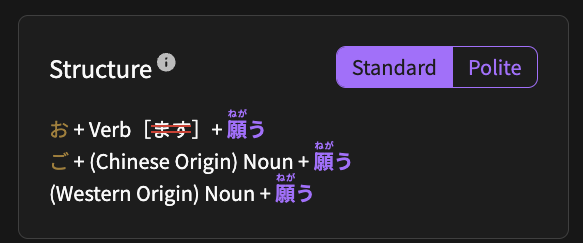please
could you please
Structure
- お + Verb[stem] + 願う
- ご + Noun (of Chinese origin) + 願う
- Noun (of Western origin) + 願う
硬
[Used to make a polite request in formal situations (business meetings, etc.)]

please
could you please
Structure
- お + Verb[stem] + 願う
- ご + Noun (of Chinese origin) + 願う
- Noun (of Western origin) + 願う
硬
[Used to make a polite request in formal situations (business meetings, etc.)]
Is this a humble speech expression, or not a humble but simply polite?
Article text says 謙譲語, but Details->Register does not, and the sentences include a Polite hint instead of Kenjougo hint.
It would be helpful for learners to take one position and apply it universally.
I think the explanation could be improved to explain 願います is also replacing the する part of する verbs 

Example :
一週間以内にお返事願います。
Instead of
一週間以内にお返事し願います。
What GPT thinks about it :
Hey @soundjona !
For this grammar point, the する part of する-verbs is not being replaced with 願います. The 願う is simply attached to the noun, so saying お返事し願ねがいます sounds very unnatural. In this instant, what chat GPT said is not correct.
I hope this helps!